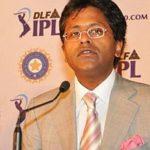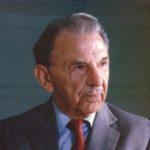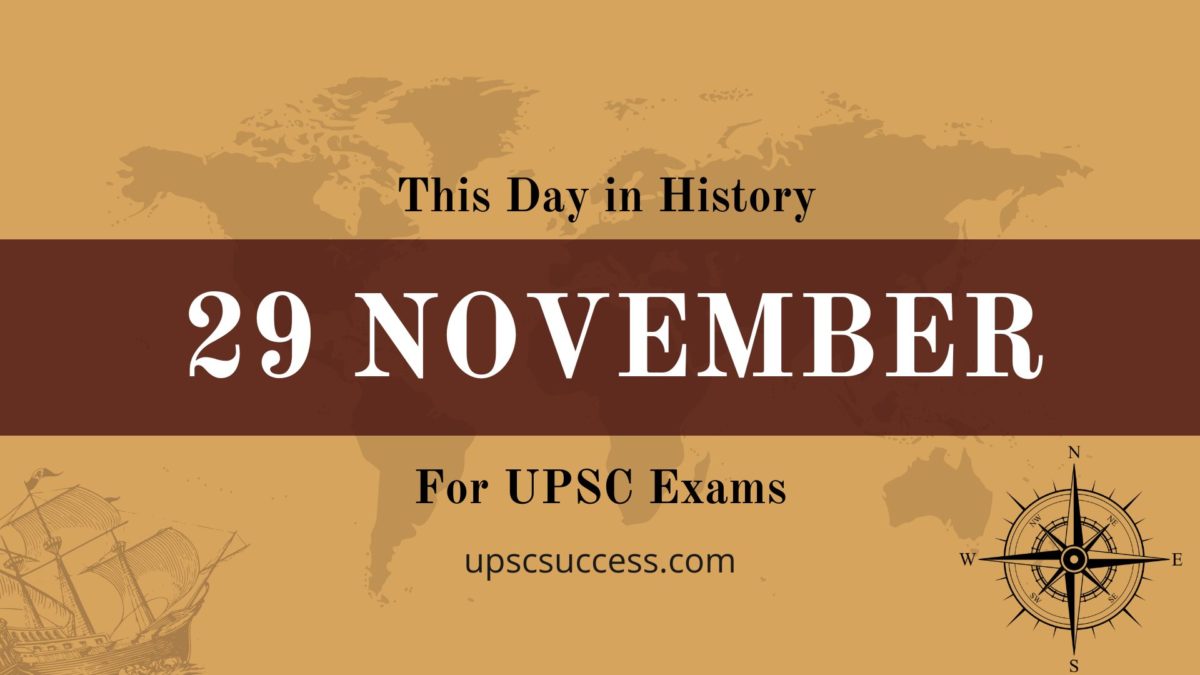Contents
This Day in History on 29 November
The historical events hold a lot of value for aspirants who are sitting for UPSC competitive exams including the IAS Exam.
On this page, we will list all historical events that occurred on 29 November. The students can refer to them while preparing for all competitive exams and banking exams.
Important Days
–
Important Events
1729: Natchez Indians massacre 138 Frenchmen, 35 French women, and 56 children at Fort Rosalie, near the site of modern-day Natchez, Mississippi.
1759: The assassination of King Alamgir II of Delhi.
1775: Sir James Jay invented musty ink.
1830: Rebellion against the rule of Russia began in Poland.
1864: American Indian Wars: Sand Creek massacre: Colorado volunteers led by Colonel John Chivington massacre at least 150 Cheyenne and Arapaho noncombatants inside Colorado Territory.
1870: Education law came into force in Britain.
1872: American Indian Wars: The Modoc War begins with the Battle of Lost River.
1877: Thomas Edison demonstrated the first phonograph.
1889: The foundation stone of ‘Glass House’ was laid in Lalbagh Garden, Bengaluru.
1944: Albania was released from Nazi occupation.
1847: Whitman massacre: Missionaries Dr. Marcus Whitman, his wife Narcissa, and 15 others are killed by Cayuse and Umatilla Indians, causing the Cayuse War.
1949: A uranium mine explosion in East Germany killed 3700 people.
1961: The world’s first astronaut Yuri Gagarin arrived in India.
1970: Haryana became the first Indian state to achieve 100% rural electrification.
1999: World’s largest meter wave radio telescope opened at Narayangaon village in Maharashtra.
2000: Former South African President Nelson Mandela received the Gandhi Peace Prize.
2004: ASEAN countries finalized a trade agreement with China.
2008: Commando operation against terrorists ended after 60 hours in Mumbai.
2012: The United Nations General Assembly gave Palestine the status of a non-member observer state.
Birth/Birth Anniversary
1786: Syed Ahmad Barelvi, an Indian Muslim revivalist.
1803: Christian Doppler, an Austrian physicist.
1849: Sir John Ambrose Fleming, a British physicist.
1869: Amritlal Vitthaldas Thakkar, popularly known as Thakkar Bappa, an Indian social worker.
1874: Antonio Moniz, Nobel laureate, and inventor of cerebral angiography.
1898: Clive Staples Lewis, a British writer, and lay theologian.
1908: N. S. Krishnan, Indian-Tamil film actor.

1919: Joey Weeder, co-founder of the International Federation of Bodybuilding and Fitness.
1920: Joseph Shivers, creator of Spandex.
1932: Jacques Chirac, the 32nd President of France.
1963: Lalit Modi, Indian industrialist.
1977: Younis Khan, a Pakistani cricketer.
1978: Shekhar Ravjiani, an Indian music director, and record producer.
Death/ Death Anniversary
1314: Philip IV of France.
1885: Satguru Ram Singh Ji, the twelfth guru in the Namdhari Sikh lineage.

1993: J. R. D. Tata, an Indian aviator, entrepreneur, and chairman of Tata Company.
2001: George Harrison, an English musician, singer, songwriter, and music and film producer.
1993 : J. R. D. Tata, French-Indian pilot and businessman, founded Tata Motors and Tata Global Beverages (b. 1904)

